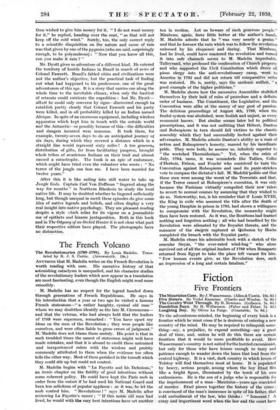The French Volcano
The Revolutionaries (1789-1799). By Louis Madelin. Trans- lated by R. J. S. Curtis. (Arrowamith. 18s.) , ANYTHING that M. Madelin writes on the French Revolution is worth reading with care. His narrative history of that astonishing cataclysm is unequalled, and his character studies of the revolutionary leaders which now appear in a translation are most fascinating, even though the English might read more smoothly.
• M. Madelin has no respect for the legend handed down through generations of French Republicans. He says in his introduction that a year or two ago he visited a famous French statesman—" a rather haughty, cynical old man " whom we may doubtless identify as the late M. Clemence-au- and that the veteran, who had always held that the leaders of 1789 were supermen, remarked : " You have upset my ideas on the men of the Revolution ; they were people 'like ourselves, and were often liable to gross errors of judgment." M.' Madelin does not blame them unduly. His point is that in such troubled times the sanest of statesmen might well have made mistakes, and that it is absurd to credit these untrained and inexperienced rulers with the wisdom and probity commonly attributed to them when the evidence too often tells the other way. Most of them perished in the tumult which they could stir up but Could not control.
M. Madelin begins with " La Fayette and his Deltisions," an ironic chapter on the futility of good intentions without some coherent policy. He could have kept the Paris mob in order from the outset if he had used his National Guard and been less solicitous of popular applause : as it was, he la the mob control him. " Revolutions ! " says M. Madelin after reviewing La FaYette's career ; If this' noble old' man had lived, he would with the very best intentions have set another
ten in motion. Let us beware of such generous people." Mirabeau, again, fares little better at the author's hands. M. Madelin admits that he "was very nearly a genius " and that he foresaw the ruin which was to follow the revolution unloosed by his etoqienee and daring. That Mirabeau, had he lived, could -have mastered the revolution and turned it into safe channels seems to : M. Madelin improbable. ,Talleyrand, who-professed the confiscation of Chhich property and who supported the CiVil 6:institution. which drove all pious clergy into the anti-revolutionary camp, -went- to America in 1793 and did not return till comparatiVe order
was restored. He is ,Surely; says the sardonic " good example of the higher politician."
M. Madelin shows how the successive Assemblies stultified themselves by their lack of rules of probedure and a definite order of business. The Constituent, the Legislative, and the Convention were alike at -:the mercy of any gust of passion. The delirious proceedings of August 4th, 1789, When the feudal system was abolished, were foolish and unjust, as every economist knows.' But similar scenes later led to political proscriptions,- and it was not unfitting that Hebert, Danton and Robespierre in turn should fall victims to the chaotic assembly which they had successfully incited against "their adversaries. M. Madelin admits -Danton's ability as a Man of - action and -Robespierre's honesty; marred by his- inordinate pride. They were both,. he assures -us; infinitely Superior- to " the wretched .Thermidorians." Yet, when the crisis of July, 1794, -Caine, it was scoundrels like Tallien, Coilot d'Ilerbois, Freron, and Fouche who contrived to turn 'the Convention against Robespierre and used its panic-stricken vote to compass the dictator's fall. M: MadeliiiVaits out that these men were among the worst '-of the Terrorists and-that, if the Terror ceased at Robespierre's execution, it was only . because 'the Parisians virtually compelled their new ' rulers to revert to normal courses by assuming thatthey wished to do so. Noteworthy; too, is his remittder-that' if Louis XVIII, the King in exile who assumed the title after-the death' Of the young Dauphin in prison in 1795, had shown a willingness to compromise With the- Revolution, the monarchy might then have been restored. As it was, the Bourbons had learned nothing and forgotten nothing :; all who hid benefited- by the Revolution were alienated by the Royalist-- threats, and the massacre of the émigrés' captured at Quiberon by Hoche completed the 'breach with the Royalist party:
M. Madelin closes his admirable book with a sketch of the oracular Sieyes, " the over-rated wind-bag " who alone survived out of all the original leaders of 1789 when Bonaparte returned from Egypt to take the place left vacant for him. " Few human events giVe, as the Revolution does, such an impre§sion of a long and certain fatalisin." '










































 Previous page
Previous page